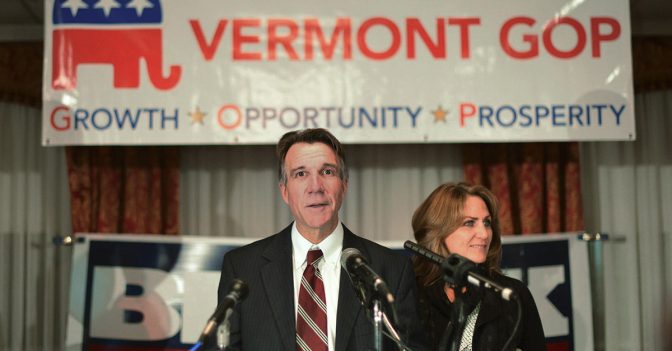Vermont’s Legalization Lite: No Model for Other States

Let’s be clear. The national headlines are incorrect. Vermont did not actually legalize cannabis this month. The Green Mountain State only enhanced its current decriminalization laws.
The legislation signed on Jan. 22 by Republican Gov. Phil Scott (pictured above) improves the state’s law from decriminalization (where an ounce of cannabis drew a $200 fine for an adult, and personal cultivation was allowed only for medical purposes) to depenalization, where adults can legally possess an ounce and can cultivate up to four cannabis plants. While it’s a historic first—the initial law permitting possession of cannabis to be enacted by a state legislature instead of by voters—it doesn’t allow a legal marketplace with taxes, licensing and consumer protections. That leaves the door open to the continued existence of a black market with arrests, prosecutions and incarceration.
The other eight states that have legalized cannabis since 2012, creating a legal and regulated industry, are Alaska, California, Colorado, Maine, Massachusetts, Nevada, Oregon and Washington. That Vermont’s law came through the legislature rather than by ballot initiative explains its conservative nature; Gov. Scott was reluctant to sign it. The legislation does create a commission that will review whether and how the state would adopt tax-and-regulate cannabis policies in the near future.
The Vermont law still flies directly into the face of a hostile Department of Justice that recently rescinded previous federal memos allowing states the autonomy to largely formulate their own progressive cannabis commerce laws. Indeed, Vermont’s moxie in the face of the Feds is the real good news.
Ever better is that New Jersey has become the next state to move toward ending marijuana prohibition. Its new governor, Democrat Phil Murphy, has specifically advocated that the state legalize cannabis in a manner similar to Colorado. A proposed legalization bill is currently being debated in Trenton. Its impact would be much more significant than Vermont’s depenalization, because of the Garden State’s far larger population, massive economy, and proximity to New York and Philadelphia.
If New Jersey legalizes cannabis commerce, the states bordering it—New York, Pennsylvania and Delaware—would predictably be pressured to enact similar reforms. In fact, in his State of the State speech on Jan. 16, Democratic New York Gov. Andrew Cuomo said he plans to to appoint a panel to look into legalization. New York is already facing similar pressure from Massachusetts and Canada gearing up for recreational sales in 2018, despite Cuomo’s insistence that marijuana is a gateway to hard drugs like heroin.
Unlike the take-the-low-road legislative rush of mainly conservative and Southern states that have adopted CBD-only laws rather than full-blown medical access to cannabis, states that want to fully benefit from legalization should adopt New Jersey’s proposed model rather than Vermont’s historic, but insufficient, legalization lite.
If you enjoyed this Freedom Leaf article, subscribe to the magazine today!

